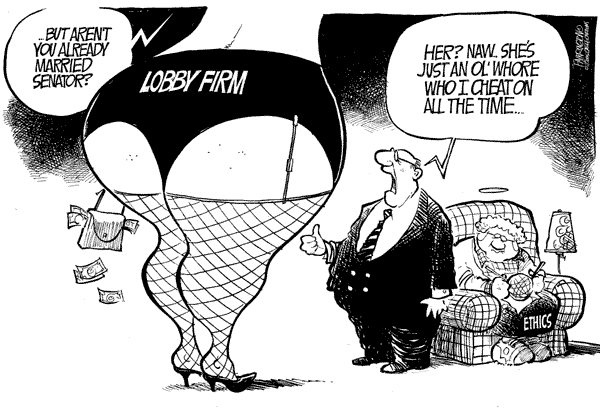Search
Democracy Links
Member's Off-site Blogs
the value of public interest .....
from Crikey .....
Four to one: our lobbyist to MP ratio
Canberra correspondent Bernard Keane writes:
Federal Parliament now has at least four lobbyists for every MP and Senator, according to the Government's Register of Lobbyists, or just under 14 for every minister and shadow minister.
The Commonwealth Lobbyist Register currently contains 631 individual lobbyists working for 267 companies, following the consolidation of several firms.
However, these are only registered third-party lobbyists. The Government does not require companies' in-house lobbyists, or the staff of industry bodies, or NGO representatives, whose full-time job is trying to influence Parliamentarians, to register.
In 2006, Press Gallery lobbying guru Julian Fitzgerald calculated that non-third party lobbyists had over 2431 staff, including 260 public relations officers. Based on Fitzgerald's figures, there are currently nearly 900 full-time lobbyists.
In Canada, where registration of all lobbyists and identification who they are lobbying and why is mandatory, there were 867 third-party lobbyists and another 1754 in-house lobbyists in 2008. Using the Canadian ratio, that suggests up to 1900 lobbyists could be engaged in trying to influence politicians in Canberra - or more than 8 lobbyists for every individual politician in Federal Parliament.
The number of lobbyists per parliamentarian in Canada is just over six.
In the United Kingdom, where there is virtually no regulation of lobbying of any kind, the number of lobbyists is thought to be over 14,000, meaning 10 lobbyists for every MP and member of the House of Lords, although attention is primarily focussed on House of Commons MPs, who are said to receive up to 20 approaches a week from lobbyists. The actual numbers remain a matter for speculation.
Washington, DC is of course the world capital of lobbying, where public policy is systematically and routinely debauched by lobbyists and party donors. The recession had led to a shake-out of lobbyist ranks but this year there are still over 12,000 lobbyists (down from over 15,000 in 2007), or 23.5 for every single senator and congressman or woman. The US political system allows greater freedom by politicians, with the whip used considerably less in Congress by both sides to control voting, and not at all in the Senate. This maximises both the difficulties and opportunities for lobbyists seeking ways to stymie a bill or get one passed.
The US system shows that even a transparent process of registration does not deter lobbyists; the circumscription of unwarranted external influences requires a comprehensive approach involving electoral donation and spending reform, greater transparency of ministerial meetings and full disclosure by lobbyists of their financial arrangements and clients.
In some ways our Lobbyist Register only gives an insight into the most anodyne end of lobbying. While the biggest and most influential third-party players are on the list -- Hawker Britton, GRA, CPR, Kreab Gavin Anderson -- the bulk of entries are, in some cases literally, mum-and-dad operations with one lobbyist and only a couple of clients - and frequently not companies or industries but NGOs or school or community associations.
But the most powerful and influential people the in the country -- the representatives of industry associations like Heather Ridout who is on Kevin Rudd's speed dial and is a regular appointee to Government reviews, or senior business figures like Rod Eddington, or prominent trade unionists - have unlimited access to decision makers well beyond any form of transparency.
At the moment, only Anna Bligh has demonstrated any commitment to the sort of comprehensive reform that would reduce our now well-entrenched political culture of access for special interests. While we may never end up quite as bad as the United States, that's the template for what happens when a democracy allows lobbyists free reign.
- By John Richardson at 8 Sep 2009 - 11:33pm
- John Richardson's blog
- Login or register to post comments

Recent comments
3 hours 55 min ago
4 hours 9 min ago
8 hours 49 min ago
10 hours 13 min ago
10 hours 22 min ago
11 hours 22 min ago
12 hours 30 min ago
12 hours 55 min ago
14 hours 30 min ago
14 hours 38 min ago